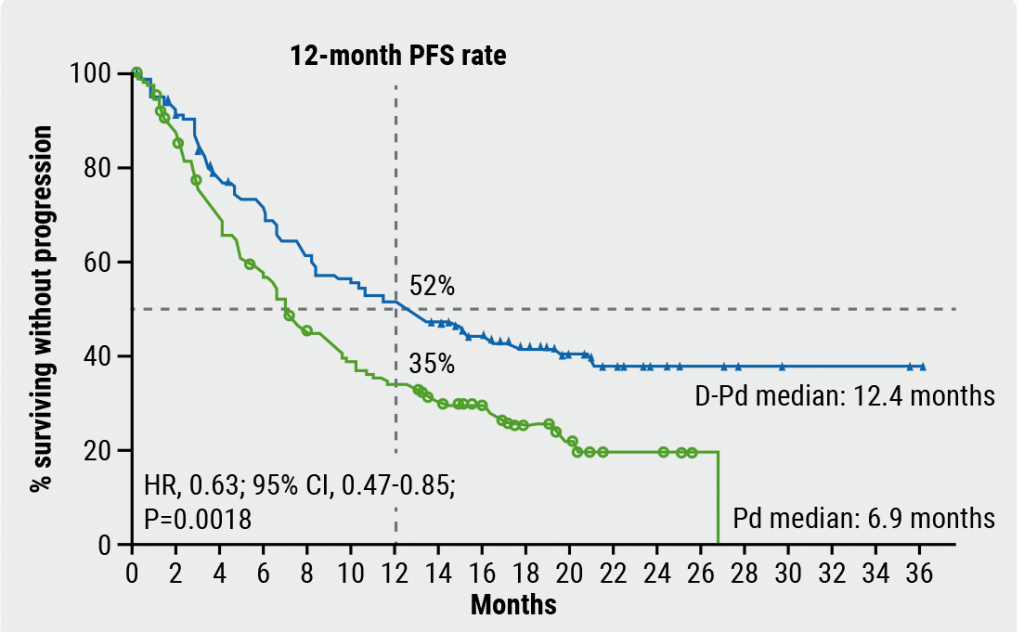FcRH5 is a type I membrane protein expressed on B cells and plasma cells. FcRH5 is found on myeloma cells with near 100% prevalence, “making it an attractive target for myeloma immunotherapy,” Dr Adam Cohen (University of Pennsylvania, Philadelphia, USA) stated. GO39775 (NCT03275103) is an ongoing phase 1 trial evaluating the safety, activity, pharmacodynamics, and pharmacokinetics of cevostamab monotherapy in R/R MM patients. Dr Cohen presented dose-escalation data from the single step-up dosing cohort.
Cevostamab was highly active in heavily pretreated R/R MM patients. The overall response rate (ORR) was 53% in patients receiving active doses. Deep and durable responses were observed in patients with high-risk cytogenetics, triple-class refractory disease, and/or prior exposure to anti-CD38 monoclonal antibodies, CAR T cells, or antibody–drug conjugates. The response was irrespective of target expression level in patients assessed to date [2,3].
The safety profile of cevostamab was manageable, 76% had cytokine-release syndrome (CRS), with grade 3 CRS in only 1 patient (2%), and single step-up dosing effectively mitigating the risk for severe CRS [2].
According to Dr Cohen, this data establishes FcRH5 as a novel target in R/R MM and demonstrates the activity of cevostamab monotherapy in this difficult-to-treat patient population. Studies evaluating dose-escalation and dose-expansion are ongoing.
- Li J, et al. Cancer Cell. 2017;31:383-95.
- Cohen AD, et al. Initial Clinical Activity and Safety of BFCR4350A, a FcRH5/CD3 T-Cell-Engaging Bispecific Antibody, in Relapsed/Refractory Multiple Myeloma. 62nd ASH Annual Meeting, 5-8 December 2020. Abstract
- Nakamura et al. Early Pharmacodynamic Changes in T-Cell Activation, Proliferation, and Cytokine Production Confirm the Mode of Action of BFCR4350A, a FcRH5/CD3 T-Cell-Engaging Bispecific Antibody, in Patients with Relapsed/Refractory Multiple Myeloma. 62nd ASH Annual Meeting, 5-8 December 2020. Abstract 3213.
Posted on
Previous Article
« Dapagliflozin reduces renal risk independent of CV disease status Next Article
IV iron reduces HF hospitalisation »
« Dapagliflozin reduces renal risk independent of CV disease status Next Article
IV iron reduces HF hospitalisation »
Table of Contents: ASH 2020
Featured articles
COVID-19
More complicated course of COVID-19 in leukaemia patients
Older age and imatinib treatment associated with COVID-19 mortality in CML
Allogeneic SARS-CoV-2-specific T cells to treat COVID-19
More severe COVID-19 outcomes for patients with haematologic malignancies
Acute Lymphoblastic Leukaemia
Improved outcomes, but still substantial part experiences relapses
Strong correlation between peripheral blood and bone marrow NGS MRD
Encouraging outcomes after autoHCT in patients with ALL
Acute Myeloid Leukaemia
Prognostic validity of AML composite model in predicting mortality
Venetoclax plus hypomethylating agents in favourable-risk AML
Encouraging clinical activity of decitabine plus ipilimumab in R/R or secondary MDS/AML
AML patients with specific mutations are unlikely to achieve MRD
Comparable outcomes with gilteritinib or quizartinib in R/R AML
First-in-class macrophage immune checkpoint inhibitor in AML
Bispecific DART® as salvage therapy for primary induction failure and early relapse
Gilteritinib in R/R AML patients priorly treated with midostaurin or sorafenib
Addition of venetoclax provides an effective, lower-intensity regimen
Chronic Leukaemia
Bosutinib effective and well tolerated in newly diagnosed CP-CML
Efficacy and safety of ponatinib in patients with CP-CML who failed second-generation TKIs
First-in-class STAMP inhibitor versus bosutinib in resistant or intolerant CML
PFS and ORR benefits of first-line ibrutinib-based treatment in CLL
Multiple Myeloma
Validation of MY-RADS response assessment category criteria
High symptom burden in transplant-ineligible patients with newly diagnosed MM
Added value of ixazomib to lenalidomide plus dexamethasone in transplant-ineligible newly diagnosed MM
Survival of transplant-eligible newly diagnosed MM in FORTE trial
Better survival with upfront autoSCT versus bortezomib-based intensification
Subcutaneous daratumumab plus pomalidomide and dexamethasone in R/R MM
Melflufen well tolerated with encouraging activity in heavily pretreated R/R MM
Initial data of FcRH5/CD3 T-cell-engaging bispecific antibody
Lymphoma
CD58 aberrations limit durable responses to CD19 CAR T-cell therapy
Anti-CD19 CAR T-cell therapy in relapsed/refractory indolent NHL
Myeloproliferative Neoplasms
MPN disease burden, quality of life, and treatment patterns
Interventions in JAK/STAT signalling pathway
Novel, orally available inhibitor of BCL-XL/BCL-2
New insights into genetics of MPN
Immune Thrombocytopenia
Mycophenolate efficacious and tolerable, even in elderly patients
First-in-class antibody sutimlimab selectively inhibits classical complement pathway
BTK inhibition provides clinically active and durable platelet response
Haemophilia, Sickle Cell Disease, Thalassaemia
First results from gene therapy trial in haemophilia B
Impact of haemophilia on children and their caregivers
Promising CRISPR gene editing results in β-thalassaemia and sickle cell disease
Erythroid maturation agent in patients with β-thalassaemia requiring regular RBC transfusions
Related Articles
February 18, 2021
Strong correlation between peripheral blood and bone marrow NGS MRD

February 18, 2021
Subcutaneous daratumumab plus pomalidomide and dexamethasone in R/R MM
© 2024 Medicom Medical Publishers. All rights reserved. Terms and Conditions | Privacy Policy
HEAD OFFICE
Laarderhoogtweg 25
1101 EB Amsterdam
The Netherlands
T: +31 85 4012 560
E: publishers@medicom-publishers.com

